What Would You Like More Information On?
Clicking on a topic will jump you to that section.
Model A Identification
Model A Vehicle Identification
Body Type Identification Charts
How to Tell a Briggs From A Murray
MAC's DISCLAIMER:
The content MAC's presents on its "Vehicle Identification & Specification" pages & in its catalogs is for information use only and is intended to be used as a guide. While MAC's makes every effort to ensure accurate content, occasionally errors may occur. MAC's does not take responsibility & will not be held liable for any automotive parts purchases, repairs or restoration decisions made as a result of information presented here or anywhere in its catalogs.
Model A Specifications
Rear Emergency Brake Specifications
Front Axle & Spindle Specifications
7-Tooth Steering Gear Specifications
2-Tooth Steering Gear Specifications
2-Tooth Steering Gear Housing Casting
Vehicle Identification

1928-29 STANDARD COUPE (45-A)

1928-29 SPECIAL COUPE (49-A)

1930-31 STD & DLX COUPE (45-B)

1928-29 BUSINESS COUPE (54-A)

1928-29 SPORT COUPE (50-A)

1930-31 SPORT COUPE (50-B)

1929 CABRIOLET (68-A)

1930-31 CABRIOLET (68-B)

1930-31 VICTORIA (190-A)

1930-31 CONVERTIBLE SEDAN (400-A)

1928-29 TUDOR SEDAN (55-A)

1930-31 TUDOR SEDAN (55-B)

1929 STEELBACK FORDOR (60-C)

1929-31 2-WINDOW FORDOR (170-A,B)

1929-31 3-WINDOW FORDOR (BRIGGS)
(155-B,D/165B,D)

1929-31 3-WINDOW FORDOR (MURRAY)
(155-A,C/165A,C)

1930-31 SLANT WINDSHIELD FORDOR (160-A,B,C)

1928-29 LEATHERBACK FORDOR (60-A,B)

1928-29 STANDARD PHAETON (35-A)

1930-31 STANDARD PHAETON (35-B)

1930-31 DELUXE ROADSTER (40-B)

1928-29 STANDARD ROADSTER (40-A)

1930-31 STANDARD ROADSTER (40-B)

1930-31 DELUXE PHAETON (180-A)

1928-29 OPEN CAB PICKUP (76-A)

1930-31 OPEN CAB PICKUP (76-B)

1928-29 CLOSED CAB PICKUP (82-A)

1930-31 CLOSED CAB PICKUP (82-B)

1928-29 STATION WAGON (150-A)

1930-31 STATION WAGON (150-B)
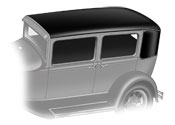
1928-29 (60-A,B) LEATHERBACK 4 DOOR SEDAN
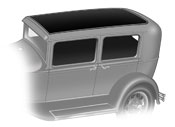
1929-31 (170-A,B) 2 WINDOW 4 DOOR SEDAN
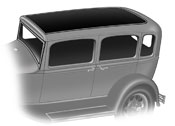
1929 (60-C) STEELBACK 4 DOOR SEDAN

1931 (160-A) SLANT WINDOW 4 DOOR MURRAY SEDAN
Model A Body Style Identification Front & Side View
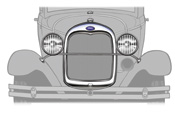
1928-29 Front View
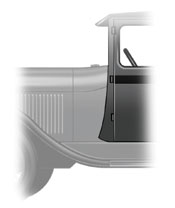
1928-29 Cowl Side View
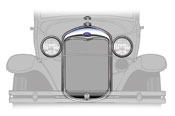
1930 Front View
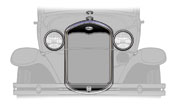
1931 Front View
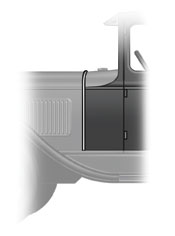
1930-31 Cowl Side View
Body Type ID Chart
Passenger Vehicles
(Slant Window)
(Murray)
(Briggs)
(Slant Window)
(Slant Window)
(2 Windows)
(2 Windows)
Body Type ID Chart
Commercial Vehicles
(131-1/2")
(Drop Floor)
(Drop Floor)
* Change-over from 1929 to 1930 models was in January, 1930 for passenger cars & in June, 1930 for commercial vehicles.
** If you cannot decide if your car body is a 60C or a 170A you can quickly tell by examining the front door post. If it is all steel, it is a 170A. If it has wood parts, it is a 60C.
Glass Specifications

To please the perfectionist, we offer Concours grade windows – intended for car show & points competition automobiles. These are superior quality 1/4" laminated safety glass (AS1 CAT-II). Exposed edges are beautifully polished or black edged & the original manufacturers sandblasted script (logo & date, sometimes referred to as the “bug”) is duplicated to reproduce the O.E.M. appearance (because they’re concours, tint options are not available). These details are applied with great care & meticulous craftsmanship.
Black edging refers to the process used to seal exposed glass edges & was necessary in the early years of automobile manufacturing. Early laminated safety glass often separated at the edges, allowing water & other contaminants between the panes. The solution was to seal the edges with a sealant. Advances in the laminating process rendered black edging obsolete in 1941, but MAC's craftspeople have re-discovered & are practicing this lost art for the detail oriented customer.
Wheel Specifications
Material: Steel
Diameter: 1928-29 21", 1930-31 19"
Rim: Drop center type; width, 1928-29 2-3/4", 1930-31 3"
Number of Spokes: 30, 1/4" diameter
Tire Specifications
Size: 1928-29, 4.50" x 21" 1930-31, 4.75" x 19"
Recommended Tire Pressure: 35 Lbs
Station Wagon: 5" x 21" or 19", pressure 40 lbs
Tread Width: 21" = 3.75", 19"3.90"

Excelsior
19" or 21"

Universal
19" or 21"

Bedford
19"
Front Brake Specifications
Braking Power: Front, 40%; Rear, 50%
Drum Diameter: 11" +/- .010"
Drum Width: 1-3/4"
Brake Shoe Length: 14"
Brake Shoe Width: 1-1/2"
Brake Shoe Lining Thickness: 3/16"
Brake Shoe Material: Woven wire & asbestos
Brake Rod Length: 51-7/16" thru 51-1/2"
Rear Emergency Brake Specifications
Drum Diameter: 9-5/8"
Drum Width: 1-3/4"
Brake Shoe Length: 28-3/4"
Brake Shoe Width: 1"
Brake Shoe Lining Thickness: 3/16" (original), 1/8" (ours)
Brake Shoe Material: Woven wire & asbestos
Front Axle & Spindle Specifications
Material Chrome alloy forging
Tensile Strength 125,000-145,000 PSI
Caster 5" (forward tilt)
Toe In 1/16" +/- 1/32"
Camber 1-13/16"
Spindle Bolt Diameter .8125" +/- .005"
Spindle Bolt Length 5-5/16"
Spindle Bolt to Bearing Clearance .001"-.002"
7-Tooth Steering Gear Specifications
Turning Radius: 17' (34' diameter)
Steering Gear Ratio: 1928-29, 11-1/4:1
Steering Wheel Diameter: 1928-29, 17-1/2"
Pitman Arm Length: 6-7/8" hole center to ball center
Ball End Angle to Shaft: 14°
Sector Shaft Bearing Clearance: .001"-.002"
2-Tooth Steering Gear Specifications
Turning Radius: 17' (34' diameter)
Steering Gear Ratio: 1930-31, 13:1
Steering Wheel Diameter: 1930-31, 17"
Pitman Arm Length: 6-7/8" hole center to ball center
Ball End Angle to Shaft: 14°
Sector Shaft Bearing Clearance: .001"-.002"
Except for minor machining differences, all the above housings are virtually identical mechanically
& all new parts furnished will fit each one.
Ford & Gemmer were the two manufacturers of the 2-tooth steering box. All parts are interchangeable, except the worm gear, 2 races & 2 bearings. The Ford box has a large “F” on the outside where the worms are located. This change was made in December of 1930 (See page 518 Service Bulletins). The Ford box used a #9 roller bearing, while the Gemmer box used a #13 roller bearing. This also changes the taper on the bearings & races. The only parts available today are for the Gemmer box; therefore, if you have the Ford box with #9 roller bearings & it becomes necessary to change any of the 5 parts, then you must convert to all 5 of the Gemmer components (A3524CD, (2) BB3571, A3553D, BB3552)
600W Oil Usage Specifications
Transmission: 1 pint
Rear End: 1-1/2 Quarts
7-tooth Steering Box: 7-3/4 ounces
2-tooth Steering Box: 4-1/2 ounces
Rear Axle Specifications
Type: Three quarter floating
Material: Special Ford carbon manganese steel
Gear Ratio: 3.78:1 (34-9) Early 1928: 3.7:1 (37-10) Trucks: 4.11:1 (37-9) 1928-29 Roadsters: 3.54:1 (39-11)
Pinion Bearing Cup: Double taper roller type B4616
Bearing Cup: B4222
Differential Bearing: B4221
Ring Gear: 8.4" pitch diameter, 1-3/16" wide teeth
Axle Shaft: 1-1/8" diameter, 1.128"-1.130"
Dimension From Housing Flange to Bearing Shoulder: Before 1929-1.370"-1.372", After 1929-1.365"-1.367"
ID of Wheel Hub: 3.188"-3.190": max. wear 3.185"
Axle & Drive Shaft Seal: B4245
Inner Axle Seal: B4245
Differential Lubricant: 600W
New Bearing Torque: 20 foot pounds
Bolt Torque: 35 foot pounds
Axle Backlash: .010"-.015"
Axle End Play: .015"-.020"
Length of Full Spline: 2-1/2"
Spline Minor Diameter: .901"-.911"
Spline Outer Diameter: 1.090"-1.091"
Pinion Bearing Torque: 15-20 foot pounds
Front Spring Specifications
Material: Chromium steel alloy
Front Spring Leaf Width: 1-3/4"
Front Spring Free Length: 30-13/16" to 30-15/16"
Leaf Thickness: 1-31/32" to 2-1/16"
Spring Off Car- Height from Top to Bottom as Sitting on Floor: 6-15/16" to 7-1/16"
Spring Off Car- Center of Eye to Eye: 30-5/8" to 30-13/16"
Ford blueprints called for each leaf to be coated with
a thick paste of graphite ground in oil.
Rear Spring Specifications
Material Chromium steel alloy
Rear Spring Leaf Width 2-1/4"
Rear Spring Free Length
Tudor & Fordor: 38-7/8" to 39"
Roadster & Coupes: 38-7/8" to 39-1/2"
Ford blueprints called for each leaf to be coated with
a thick paste of graphite ground in oil.
Cylinder Head Specifications
1928 Head: 4.3:1 compression ratio, 47.3 HP, 242cc displacement. Compression in individual cylinders: 80, 85, 83, 82 PSI
1930 Head: 4.1:1 compression ratio, 44.3 HP, 258cc displacement. Compression in individual cylinders: 77, 79, 82, 79 PSI
Normal Listed Compression: A6050A, 75 pounds; A6050B, 110 pounds; B6050, 90 pounds
Head Nut Torque: 50 foot pounds
Engine Specifications
Rated Horsepower: 24.03 SAE
Brake Horsepower: 40 HP at 2200 rpm (Model AF 28 at 2000 rpm)
Firing Order: 1-2-4-3
Compression Ratio: 4.11:1
Compression Pressure:: A6050A head, 76 PSI A6050B head, 110 PSI B6050 head, 90 PSI
Piston Displacement: 200.5 cubic inches
Bore: 3.876" (Model AF: 3.050")
Stroke: 4.250"
Torque: 128 foot pounds at 1000 rpm
Cylinder Offset from Crankshaft Centerline: 1/8"
Crankshaft to Camshaft Centerline: 4.155"
Piston Specifications
Displacement 200.5 cubic inches
Material Aluminum
Weight 1 lb. 1-7/8 oz. (476.8 grams)
Variance in Weight of Pistons +/- 2 grams
Weight with Rings Installed 1 lb. 4-1/2 oz. (581.2 grams)
Weight with Rings & Pin 1 lb. 8-3/4 oz. (701.7 grams)
Diameter 3.8745" (Bore 3.875")
Length 3-29/32"
Piston Skirt .001: small on the top than on the bottom of the skirt
Piston Pin Hole .9996" to .9998" diameter
Piston Pin Diameter 1.0001" to 1.0004"
Pin Length 3.536" to 3.546"
Compression Height (Top of piston to pin centerline) 1-29/32"
Variation in Piston Compression Height .003" to .005"
Piston Pin Bushing ID .992", OD 1.0675"
Length 1.593"
Pin Fit in Rod Bushing .0003" max
Pin Fit in Piston .0002" to .0005" shrink fit
Pin Bore Parallel to Head of Piston +/- .001"
Piston Fit in Cylinder .002" max
Piston Ring Specifications
Ring Diameter: Same as piston, 3.875" stock
Ring Groove: Depth, 7/32", Width - Upper 2, 1/8" Lower, 5/32"
Ring Taper: .001"- narrower at the top than the bottom
Ring Clearance in Groove: .001" to .002"
Ring End Gap: Top .012" to .015"; Middle .010" to .012"; Lower .008" to .010"
All piston ring sets are US made Grant or Hastings brands with 3 rings. The gap of the rings must not line up, MAC's suggests keeping them about a 1/4 turn from each other.
Connecting Rod Specifications
Material: Steel forging
Weight: 1 lb, 6 oz.
Balance Weight: 552 grams +/- 1 gram, crank end 198 grams +/- 1 gram, pin end
Length: 7-1/2" center to center
Crankshaft Bearing: 1-1/2" diameter, 1-5/8" wide
Piston Pin Bearing: 1" diameter, 1-5/8" wide
Bearing Side Clearance: .008" to .012"
Pin Side Clearance: .040" to .053" between pin bosses
Piston Pin Clearance: .0005"
Crankshaft Clearance: .001"
Bearing Cap Bolt Torque: 40-50 foot pounds.
Connecting rod is assembled with oil dippers toward camshaft.
Camshaft Specifications
Shaft Diameter: 7/8"
Bearing Diameter: 1.560"
Block Bore Diameter: 1.561"
Bearing Clearance: (Max.) .003"
Bearing Length: Front, 1-3/4"; Center, 2"; Rear, 1"; 4th (1928), 7/8"
Lift of Cam: .030" (Model B: .339" exhaust; .334" intake)
Duration: 236º
Lobe Center Angle: 113-1/2º
End Play Spring Tension: Approximately 35 pounds
Timing Gear Mounting Flange: 2-5/16" diameter, 5/16" thick
Camshaft Material: Special Ford carbon manganese steel
Cam Shaft Gear: Bakelized material
Number of Gear Teeth: 50
Camshaft Gear Type: Spiral teeth
Gear Backlash: .003" to .005"
Gear Rotation Speed: 1/2 of crankshaft
Camshaft Straightness: .0005" to .001"
Variation in Eccentricity of Pitch Diameter of Gear Teeth: .0015"
Variation in Maintaining Center Distance of Mating Gears +/-: .001"
Gear Tolerances in Regular Spacing of Teeth: 0.0"
Crankshaft Specifications
Material: Ford carbon manganese steel
Weight: 28 pounds
Length: 26"
Diameter: 1.624" main bearings; 1.499" crank pins
Length of Main Bearings: Front & Center, 2"; Rear 3"
Length of Crank Pins: 1-5/8"
Crank Pin Taper & Roundness: .0005" to .001"
Total Main Bearing Surface: 11-1/2 square inches
Rear Flange Thickness: 3/8"
Crankshaft Gear: 25 spiral teeth
End Clearance: .004" to .007"
Main Bearing Clearance: .001"
Crankshaft Straightness: .0005" to .001"
Main Bearing Cap Torque: 80-100 foot pounds
Distance from Top Surface of Front Cross Member to Crankshaft Centerline: 2-33/64"
Flywheel Specifications
Weight: 63 lbs., 4 oz. (Model B 52 to 55 lbs.)
Balance: Within 15 in./oz.
Ring Gear Shoulder Diameter: 12.470"
Ring Gear Outside Diameter: 14.2"
Number of Ring Gear Teeth: 112
Ring Gear to Starter Drive Ratio: 11.2: 1
Flywheel Bolt Torque: 65 foot pounds
Pilot bearing hole is concentric with crankshaft flange shoulder within .002" TIR (Total Indicator Reading).
Clutch mounting surface & clutch disc surface must run true to crankshaft within .005" TIR (Total Indicator Reading).
Clutch mounting shoulder diameter must be concentric with crankshaft flange diameter within .005" TIR (Total Indicator Reading).
Flywheels provide momentum to keep the crankshaft spinning. As the flywheel spins faster, a vibration will occur if it’s out of balance. It’s best to have your flywheel, with clutch & pressure plate, balanced so that when you place in the clutch disc & reinstall the pressure plate it will retain balance.
Valve Specifications
Lift .287" with .015" clearance
Seat Angle 45º
Seat Width 3.32"
Stem Diameter .311"
Valve Length 5.677"
Head Diameter 1.537"
Valve Opening Diameter 1-3/8"
Port Diameter 1-3/8"
Clearance, Exhaust Valves in Guides .002"
Clearance, Intake Valves in Guides .001" to .0015"
Valve Lifter Clearance .010" to .013"
Lifter Diameter Clearance .0015"
Valve Guides .3135" ID; .5938" OD; length 2.125" (early 2.375")
Valve Spring 1.022" OD; free length 2-15/16"; comp. length
2-1/14" (57-64 lbs.); tension (closed) 34 to 38 lbs.
Valve Lifter A6500A (used with A camshaft), length 2.486";
head diameter 1.117".
Valve Timing Intake opens 7-1/2º before Top Dead Center; closes 48-1/2º after Bottom Dead Center. Exhaust opens 51-1/2º before Bottom Dead Center; closes 4-1/2º after Top Dead Center.










